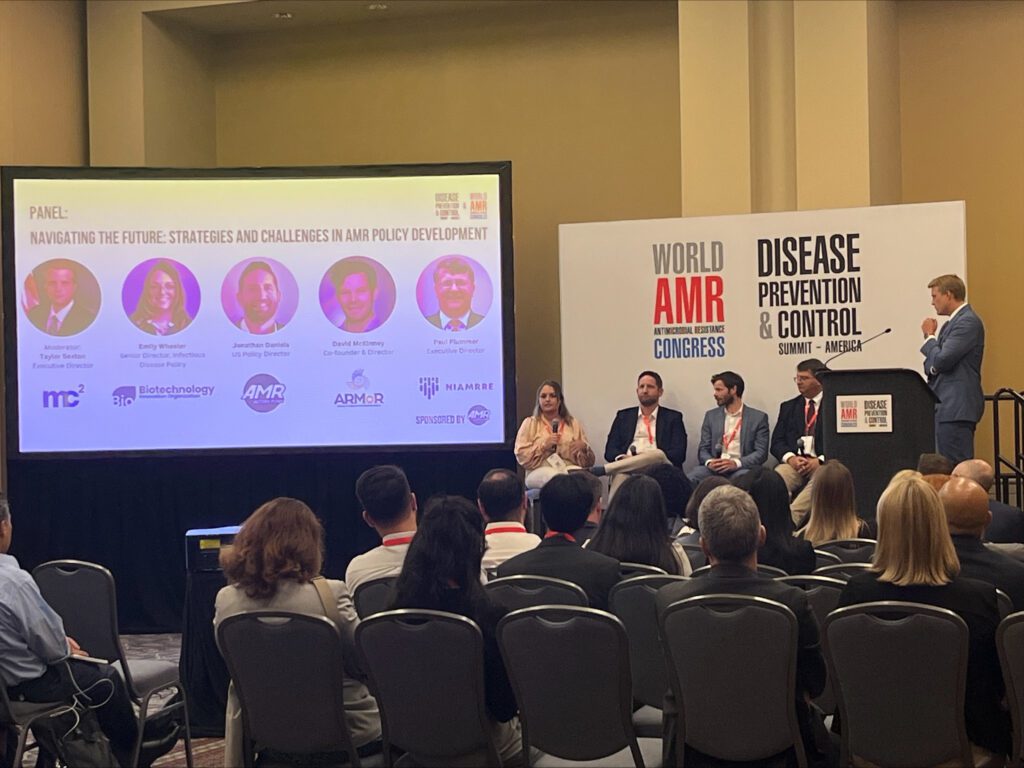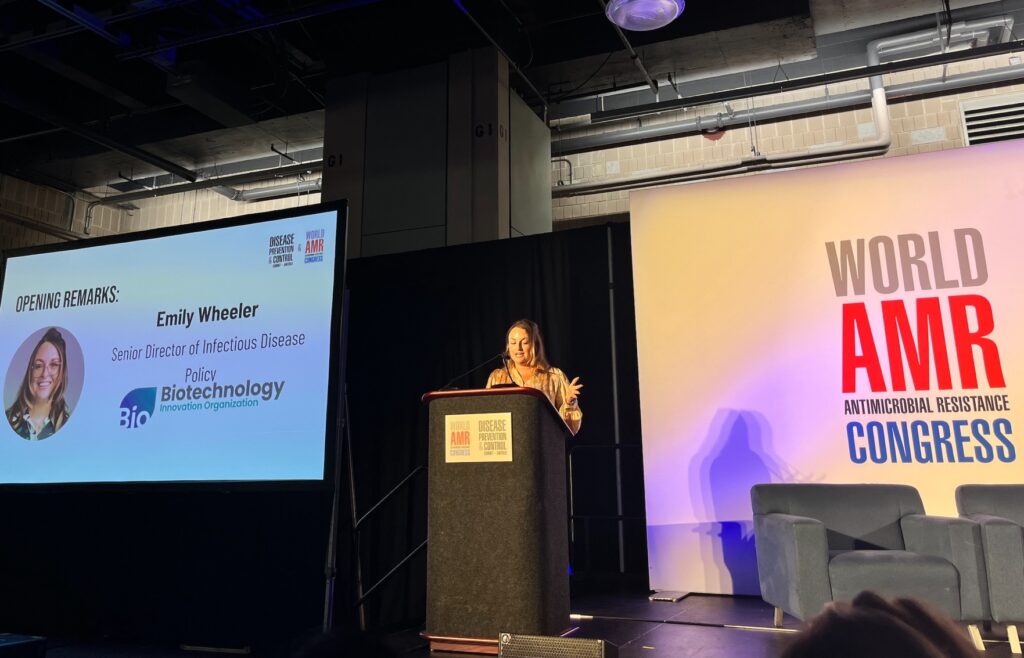Antimicrobial resistance (AMR) is one of the clear and present threats of our time, and if left unchecked could have dire consequences. In 2019, antibiotic-resistant infections played a role in nearly 5 million deaths worldwide and AMR threatens to kill a projected 10 million by 2050.
Healthcare leaders came together to address this issue Sept. 5-6 in Philadelphia at the World AMR Congress, where Emily Wheeler, Biotechnology Innovation Organization’s (BIO) Vice President of Infectious Disease Policy, gave a keynote as the conference’s Chair. Wheeler also participated in the panel, Navigating the Future: Strategies and Challenges in AMR Policy Development, which “explore[d] the future of AMR policy development with insights on sustaining innovation, ensuring global access, and overcoming implementation challenges.”
“We’re all here today because we know we’re racing against time,” Wheeler said during her opening remarks. “Antimicrobial resistance isn’t some far-off problem—it’s here, it’s now, and it’s serious.”
Throughout her opening remarks, Wheeler reminded conference attendees of the stark reality and challenges that the biotech industry faces when it comes to R&D associated with AMR.
A broken market
“The market for new antimicrobials is fundamentally broken,” she said. “Nine antibiotics from small companies have received FDA approval since 2013. Every company behind those antibiotics—with the exception of one—has gone bankrupt, been sold for a fraction of its worth, or is under water and on a concerning trajectory.”
Wheeler added that not only is the pipeline for antimicrobials broken, but the public understanding of proper use is also contributing to the problem. “Antimicrobials are meant to be used only when appropriate—and their value to public health—to everyone, everywhere, is not appropriately understood and recognized.”
“A life-saving antibiotic might provide a new therapeutic option for patients and save lives, yet barely turn a profit, due to these unique post-approval challenges,” notes Wheeler. “That’s very different than the ecosystem—and broader market dynamics—for medicines that address other conditions.”
As a result, most large biotech and pharmaceutical companies have abandoned AMR R&D entirely, leaving a notable and dangerous void in the system that smaller companies are struggling to fill.
“The pipeline for new antimicrobials has slowed to a trickle, even as existing drugs lose effectiveness,” said Wheeler. “Though there is exciting science in discovery and development, these innovations face a post-approval ecosystem that makes it near impossible to stay afloat. We’re facing a drought in bringing these innovations out of R&D and effectively to patients, just when we need a flood of new therapeutic options.”
But there is hope, said Wheeler, as long as there is the political and social will to make fundamental change to address this need.
One solution: The PASTEUR Act

“Here’s one idea,” stated Wheeler. “What if we paid for antibiotics based on their value to public health, instead of how much we use them? The PASTEUR Act, a bipartisan bill before Congress, offers such a model—one that is fundamentally rooted in appropriate antimicrobial use—by establishing a subscription-style system where the government pays for access to vital new antimicrobials, regardless of how little they’re used.”
Passing PASTEUR has been a fundamental policy point for BIO over the years as the organization has worked hand-in-hand with other stakeholders and policymakers to push the prioritization of AMR R&D.
The policy proposal’s innovative model for antimicrobials solves multiple problems at once. “It gives companies the confidence they need to invest in new antimicrobials because they will have an opportunity to earn a predictable return on their investment,” said Wheeler. “It underscores good medical practices of using these drugs appropriately, which is crucial for keeping them effective. And it means that when we need these new treatments, they’ll be there—even if we hope to use them only when critically necessary.”
But the passing of the PASTEUR Act is not a silver bullet, rather it is a step in the right direction with the understanding that the marathon is not yet finished. Collaboration is key and events like the World AMR Congress are paramount to the continued global defense (and eventual offense) strategy to subdue antimicrobial resistance for years to come.
“The actions we take in the coming months and years will determine whether future generations have access to effective antimicrobials,” said Wheeler. “The stakes could not be higher. But I’m confident that when we look back on this moment, we’ll be able to say we rose to the challenge.”
“The world is counting on us,” Wheeler concluded.




